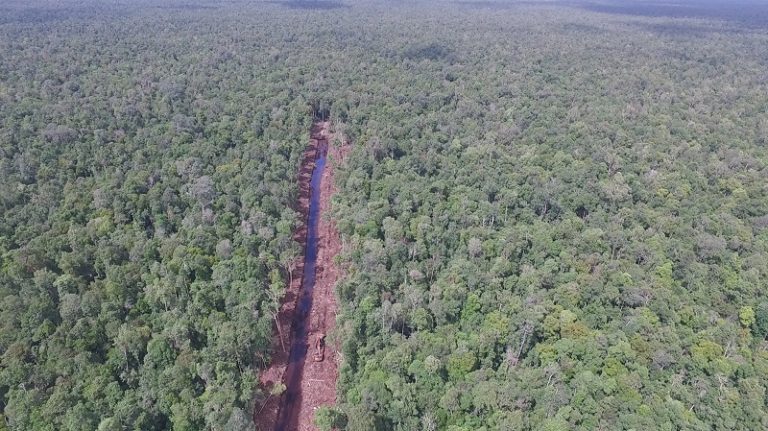- Illegal logging continues inside an orangutan habitat in Borneo that the Indonesian government had decreed off-limits last year, an investigation by Greenpeace has found.
- The group reported at least six logging camps in the concession held by a timber company, but noted that it was unclear whether the company itself, PT Mohairson Pawan Khatulistiwa (MPK), was engaged in the illegal logging.
- This is the second time Greenpeace has found indications of commercial exploitation in the area since the government ordered PT MPK to halt its operations last year.
JAKARTA — At least six illegal logging camps have sprung up in a peat forest in Indonesian Borneo that the government had declared off-limits last year, a Greenpeace investigation has revealed.
The environmental group’s probe in March this year found the camps inside a concession held by timber company PT Mohairson Pawan Khatulistiwa (MPK), in the Ketapang district of West Kalimantan province.
The concession itself covers 484 square kilometers (187 square miles) of land, or 85 percent of the Sungai Putri landscape, home to an estimated 950 to 1,200 critically endangered Bornean orangutans (Pongo pygmaeus) and one of the last pristine coastal peat swamp forests remaining on the island of Borneo.


Greenpeace said logging was taking place at night, including in locations where orangutan nests were found, and ending just before dawn as trucks arrived to transport the woodpiles to nearby sawmills and furniture shops.
“This is a major embarrassment for the Indonesian government, which has consistently promised to protect Sungai Putri,” Greenpeace campaigner Ratri Kusumohartono said in a statement.
In March 2017, the Ministry of Environment and Forestry ordered PT MPK to cease its operations in the area because they violated a moratorium on peatland development. Photos emerged of a huge canal the company had dug to drain the forest in preparation for what it called a trial plantation as well as for transporting felled logs to a sawmill.
Large-scale drainage of Indonesia’s vast peat swamps, in particular by palm oil and pulpwood companies, has left the land highly combustible, exacerbating annual fires that are usually sparked for slash-and-burn clearing activities.
The Greenpeace exposé is the second investigation that has revealed continued commercial exploitation of the Sungai Putri forest in defiance of the government order for a halt to such activities. In November last year, the NGO published photos that showed an extensive canal full of water, alongside excavators and pulpwood tree seedlings being planted.
“The government cannot let this stand — it must uphold the law and ensure the full and permanent protection of this beautiful and important forest,” Ratri said.
Greenpeace noted it was unclear whether PT MPK was carrying out the logging or if other parties were taking advantage of roads built by the company to further encroach on the forest and orangutan habitat.
PT MPK, linked to a Chinese investment firm, obtained permits in 2008 from the government to log the area. Logging activities are strongly supported by the provincial government as a means of boosting investment in the region. PT MPK did not immediately respond to Mongabay’s requests for comment on Greenpeace’s latest findings.


“Habitat destruction forces orangutans to enter neighboring plantations and farms looking for food and this frequently leads to conflict with humans,” Karmele Llano Sanchez, program director of International Animal Rescue in Indonesia, said in the statement.
“Sungai Putri is home to one of the largest populations in the world and we are at a critical point for the Bornean orangutan, without forests like this they can’t survive,” she added.
Sungai Putri hosts “one of the largest unprotected [orangutan] populations in the whole of Indonesia,” according to a 2016 joint report by the Borneo Nature Foundation and International Animal Rescue. Ratri said the survival of the species “relies on creating wildlife havens and protecting the existing ones” like Sungai Putri.
“It is time for the Indonesian government to ensure the full protection of Sungai Putri, its environment and wildlife,” she said.


FEEDBACK: Use this form to send a message to the author of this post. If you want to post a public comment, you can do that at the bottom of the page.







